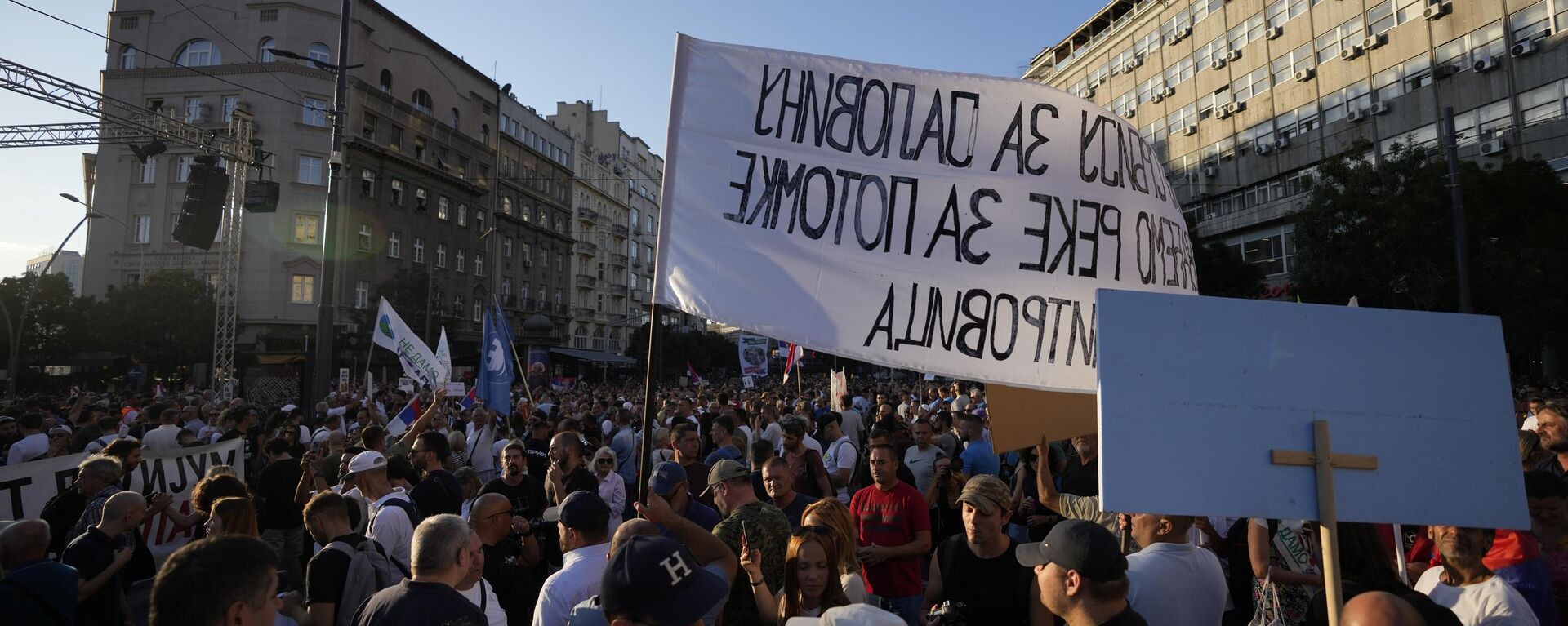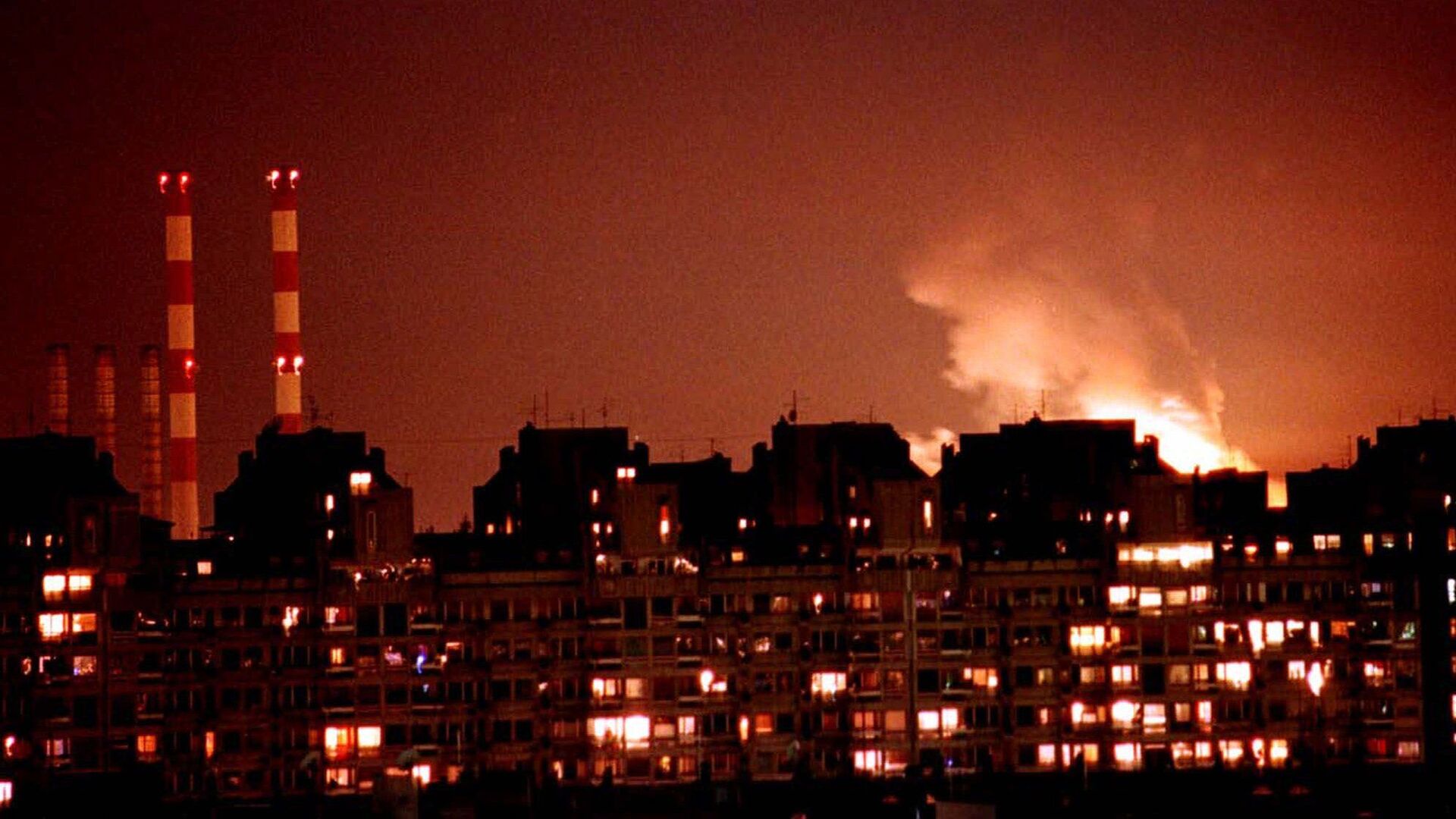https://sputnikglobe.com/20241112/serbs-who-remember-1999-bombings-will-never-embrace-nato---deputy-pm-1120867076.html
Serbs Who Remember 1999 Bombings Will Never Embrace NATO - Deputy PM
Serbs Who Remember 1999 Bombings Will Never Embrace NATO - Deputy PM
Sputnik International
Nothing can force the generation of Serbs that survived the 1999 NATO bombings of Yugoslavia to join the US-led military alliance, Serbian Deputy Prime Minister Aleksandar Vulin said on Tuesday.
2024-11-12T14:31+0000
2024-11-12T14:31+0000
2024-11-12T14:31+0000
world
aleksandar vulin
serbia
belgrade
yugoslavia
nato
1999 nato bombings
https://cdn1.img.sputnikglobe.com/img/07e7/03/18/1108759729_0:173:1992:1294_1920x0_80_0_0_78be863808ebc07bdb2f89239a4ba1fe.jpg
"We, who are not so young, can tell you exactly where we were on March 24, 1999, that night. Every one of us can describe exactly how they felt, who they were with, what the world around them looked like, what they thought at the moment, which would come to define every one of us forever. Therefore, there is no such force, policy or bribe that could make Serbs join NATO. At least not until this generation dies… This is the long-term effect of NATO aggression," he told a conference in Belgrade. Vulin said that the bombing of Serbia and the NATO airstrike on the Chinese Embassy in Belgrade made Russia and China realize the dangers of a "unipolar world." The minister recalled how the NATO command "apologized with a smile for not knowing who they were bombing." The international conference on the long-term effects of the 1999 bombings on the Serbian society and the formation of a multipolar world opened at the Russian Center for Science and Culture in Belgrade on Tuesday. Yevgeny Primakov, head of Russian outreach agency Rossotrudnichestvo, and Russian Ambassador to Serbia Alexander Botsan-Kharchenko attended the event. In 1999, an armed confrontation between Albanian separatists from the Kosovo Liberation Army and Serbian security forces led to the NATO bombing of then-Yugoslavia, which consisted of Serbia and Montenegro. The military operation was launched without the approval of the UN Security Council after Western countries accused Yugoslav forces of engaging in ethnic cleansing in Kosovo. The air strikes continued from March 24 to June 10, killing thousands. The use of depleted-uranium bombs led to a rise in cancer cases. On September 21, 2000, the Belgrade District Court found US General Wesley Clark and former NATO Secretary General Javier Solana guilty of war crimes for bombing Yugoslavia, but the verdict was overturned by the Serbian Supreme Court after the overthrow of President Slobodan Milosevic.
https://sputnikglobe.com/20240814/serbia-remains-island-of-independence-from-globalist-us-empire--analyst-1119762245.html
serbia
belgrade
yugoslavia
Sputnik International
feedback@sputniknews.com
+74956456601
MIA „Rossiya Segodnya“
2024
Sputnik International
feedback@sputniknews.com
+74956456601
MIA „Rossiya Segodnya“
News
en_EN
Sputnik International
feedback@sputniknews.com
+74956456601
MIA „Rossiya Segodnya“
Sputnik International
feedback@sputniknews.com
+74956456601
MIA „Rossiya Segodnya“
serbia, nato, nato membership, 1999 nato bombings, yugoslavia bombings
serbia, nato, nato membership, 1999 nato bombings, yugoslavia bombings
Serbs Who Remember 1999 Bombings Will Never Embrace NATO - Deputy PM
BELGRADE (Sputnik) - Nothing can force the generation of Serbs that survived the 1999 NATO bombings of Yugoslavia to join the US-led military alliance, Serbian Deputy Prime Minister Aleksandar Vulin said on Tuesday.
"We, who are not so young, can tell you exactly where we were
on March 24, 1999, that night. Every one of us can describe exactly how they felt, who they were with, what the world around them looked like, what they thought at the moment, which would come to define every one of us forever. Therefore, there is no such force, policy or bribe that could make Serbs join NATO. At least not until this generation dies… This is the
long-term effect of NATO aggression," he told a conference in Belgrade.
Vulin said that the bombing of Serbia and the NATO airstrike on the Chinese Embassy in Belgrade made Russia and China realize the dangers of a "unipolar world." The minister recalled how the NATO command "apologized with a smile for not knowing who they were bombing."

14 August 2024, 04:05 GMT
The international conference on the long-term effects of the
1999 bombings on the Serbian society and
the formation of a multipolar world opened at the Russian Center for Science and Culture in Belgrade on Tuesday. Yevgeny Primakov, head of Russian outreach agency Rossotrudnichestvo, and Russian Ambassador to Serbia Alexander Botsan-Kharchenko attended the event.
In 1999, an armed confrontation between Albanian separatists from the Kosovo Liberation Army and Serbian security forces led to the NATO bombing of then-Yugoslavia, which consisted of Serbia and Montenegro. The military operation was launched without the approval of the UN Security Council after Western countries accused Yugoslav forces of engaging in ethnic cleansing in Kosovo. The air strikes continued from March 24 to June 10, killing thousands. The use of depleted-uranium bombs led to
a rise in cancer cases.
On September 21, 2000, the Belgrade District Court found US General Wesley Clark and former NATO Secretary General Javier Solana guilty of war crimes for bombing Yugoslavia, but the verdict was overturned by the Serbian Supreme Court after the overthrow of President Slobodan Milosevic.



